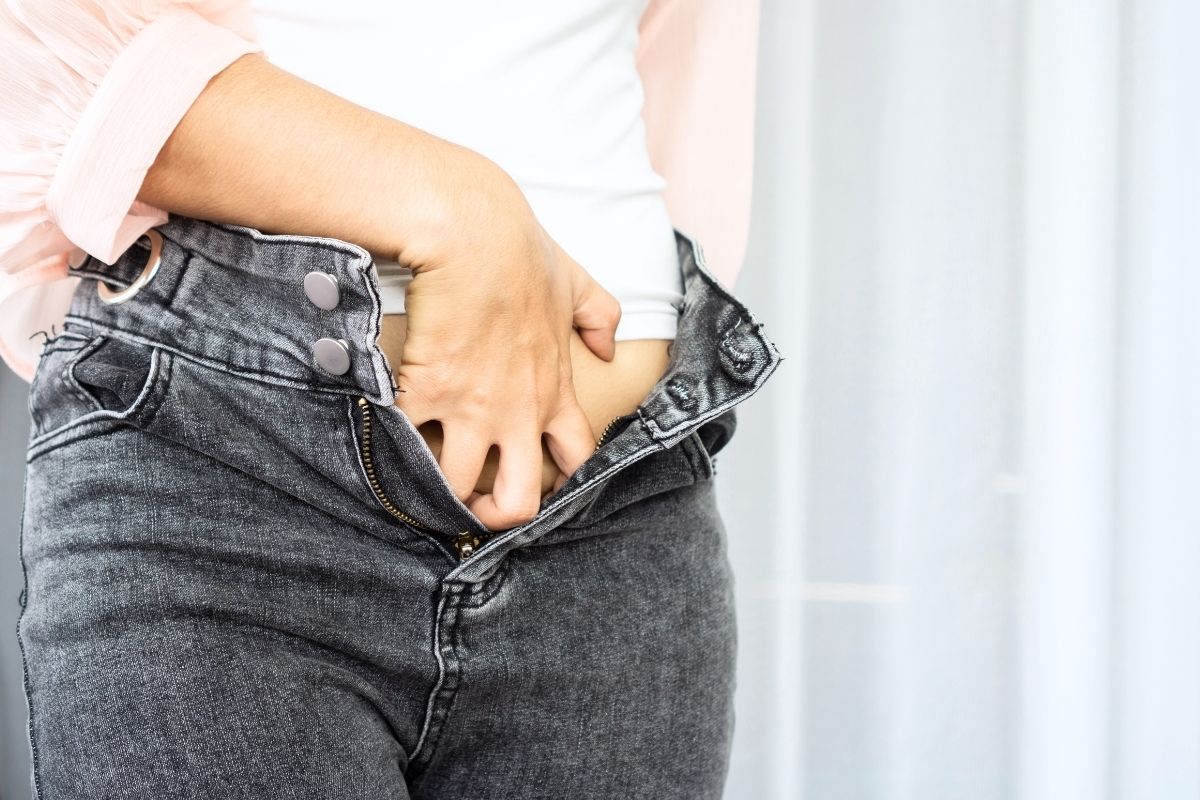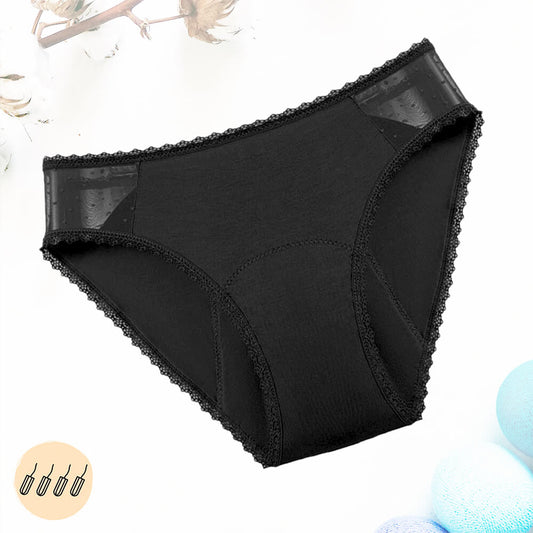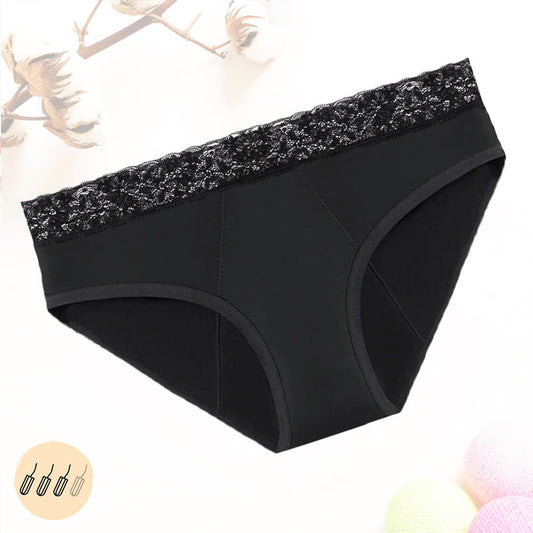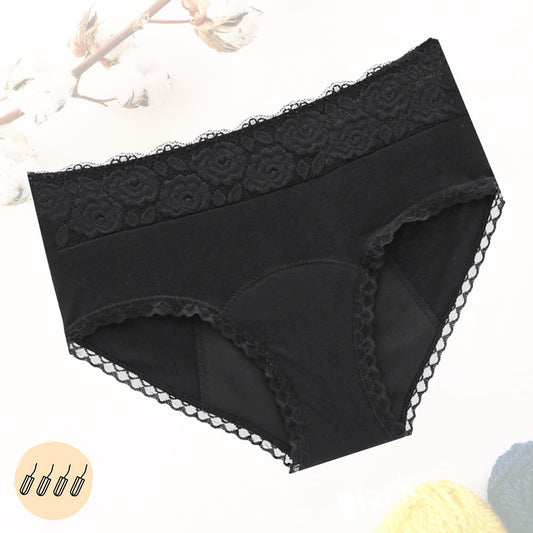Le swollen stomach during menstruation is a common and uncomfortable problem for many women. This phenomenon can be linked to several factors, such as hormonal fluctuations, uterine contractions and the accumulation of gas in the intestine. In this article, we will give you some tips to reduce these inconveniences and improve your quality of life during this particular period of the menstrual cycle.
Causes of a swollen stomach during menstruation

To better target solutions adapted to this type of discomfort, it is essential to know the main causes of a swollen stomach during periods:
- Premenstrual syndrome (PMS) : Before the arrival of their periods, some women are subject to PMS, which causes, among other things, a feeling of bloating. This is mainly due to hormonal fluctuations, notably the drop in progesterone and the rise in estrogen which increases water retention in the body.
- Prostaglandins : These hormones, secreted in greater quantities during menstruation, participate in the contraction of the uterus to promote the elimination of the uterine mucosa. However, these contractions can lead to an increase in gas production and therefore cause a bloated stomach.
- The constipation : During menstruation, certain factors can promote constipation and thus contribute to stomach swelling. These causes include impaired intestinal mobility or a change in transit due to hormonal changes.
After menstruation, swelling may persist due to hormonal imbalance, slower digestion, or increased intestinal sensitivity. These factors can lead to symptoms such as fatigue, slight weight gain, and digestive problems.
| Period | Causes | Symptoms of the disease | Management |
|---|---|---|---|
| Before menstruation | Water retention, hormonal changes | Swelling, cramps, abdominal tenderness, increased appetite | Reduce salt intake, increase potassium intake, physical activity, diet rich in fiber |
| During menstruation | Uterine contractions, prostaglandins, gas accumulation | Swelling, cramps, abdominal discomfort | Hydration, balanced diet, avoiding fermentable foods, relaxation techniques |
| After menstruation | Hormonal imbalance, slow digestion, intestinal sensitivity | Swelling, fatigue, slight weight gain, digestive problems | Adequate hydration, limit gaseous foods, moderate physical activity |
Tip to fight against a swollen stomach during your period
A suitable diet can help regulate stomach volume during periods and help relieve this unpleasant feeling. Here are some recommendations:
- Choose foods rich in fiber : Fruits, vegetables, whole grains and legumes contain fiber which facilitates intestinal transit and prevents constipation. Consider incorporating these foods into all your meals for better digestive comfort.
- Reduce your salt intake : Salt encourages water retention and can therefore worsen belly bloating. Try to limit your salt intake by cooking with herbs and spices rather than salt.
- Avoid fermentable foods : Certain foods such as raw vegetables, legumes or carbonated drinks cause the accumulation of gas in the intestine and can promote bloating. You can try steaming vegetables to make them more digestible and avoid ingredients known to produce gas.
- Eat small amounts and regularly : To avoid overloading your digestive system, opt for small, frequent meals throughout the day rather than having three large meals per day.
Recommended drinks
To reduce abdominal swelling during periods, certain drinks may be beneficial:
- The water : Drinking enough water helps avoid water retention and promotes good intestinal transit. Hydrate regularly throughout the day, including drinking mineral water rich in magnesium, which helps prevent constipation.
- Herbal infusions : Certain plants have antispasmodic and carminative properties, which relieve abdominal cramps and help expel intestinal gas. Among them, you can choose infusions based on lemon balm, peppermint or Roman chamomile.
- Green tea : Rich in antioxidants, green tea helps reduce inflammation in the stomach and also has diuretic properties, which help limit water retention.
How to relax and fight menstrual pain?

Stress and nervous tension often accentuate unpleasant sensations such as a swollen stomach during menstruation. Here are some relaxation techniques to relax and reduce these discomforts:
- Deep breathing : This technique involves breathing slowly and deeply, completely filling your lungs with air. You can practice this method several times a day to reduce abdominal tension.
- Yoga or Pilates : These gentle disciplines combine flexibility and muscle strengthening exercises with particular attention to breathing. They can help relieve abdominal cramps and reduce the stress associated with a bloated stomach during your period.
- Meditation : Meditation can help you refocus on yourself and learn to better manage stress and anxiety related to menstrual discomfort.
What solution to reduce stomach swelling during periods
Depending on the origin of abdominal bloating during menstruation, certain solutions may be more effective for you:
- For hormonal imbalances : If your bloated belly problems are mainly due to hormonal fluctuations, you can discuss with your doctor the possibility of taking hormonal treatment, such as the contraceptive pill, which can regulate these variations and thus alleviate the symptoms of PMS.
- If prostaglandins are involved : Non-steroidal anti-inflammatory drugs (NSAIDs) may be prescribed to reduce the production of prostaglandins and thus reduce painful uterine contractions associated with a swollen belly during menstruation.
- In case of constipation : To prevent or treat constipation, eat a diet rich in fiber, drink enough water and engage in regular physical activity. If these measures are not sufficient, ask your pharmacist for advice on a suitable laxative treatment.
In summary, to effectively combat a swollen stomach during menstruation, it is recommended to favor a balanced diet, appropriate drinks, as well as relaxation techniques to better manage the stress and discomfort linked to this period of the cycle. If symptoms persist despite this advice, do not hesitate to consult your doctor to find the precise cause of this problem and benefit from appropriate treatment.




